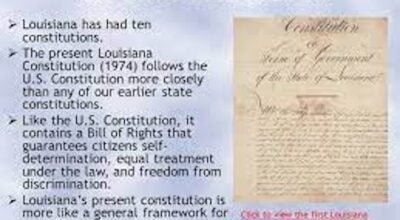Expand voting when possible
Published 4:51 pm Friday, January 11, 2019
Should a citizen who committed a crime and who was put on probation instead of being sent to prison be allowed to vote? The answer to that question depends on whom you ask.
The Legislature at its 2018 regular session passed Act 636 that says anyone who is “under an order of imprisonment” for conviction of a felony and who hasn’t been incarcerated within the last five years shall be able to vote. Most of the debate at the session indicated the new law would affect between 2,200 and 3,500 people.
State Rep. Joe Marino, I-Gretna, and an attorney, said he now thinks it might apply to most probationers. He said he wishes the law had been drafted more precisely. It is now believed the law also allows about 34,000 people on probation the right to vote.
Secretary of State Kyle Ardoin didn’t support Act 636, and his office says technical wording of the law complicates the ability to enforce it. Nevertheless, the office said it is reviewing its options about how best to implement the law by March 1.
Once the word got out that 34,000 more citizens would be able to vote, the conspiracy theorists went to work. Some accused Democratic Gov. John Bel Edwards of deceiving Republicans in the Legislature in order to get more Democratic voters to help him be re-elected this fall.
No surprises there since the same theorists have come up with many wild and unsubstantiated accusations about Edwards over the last three years.
Indications are that state Rep. Patricia Smith, D-Baton Rouge, sponsor of Act 636, took the word of Department of Corrections officials who told her the legislation affected only 2,200 to 3,500 people. If legislators were misinformed, they have only themselves to blame.
Bruce Reilly, deputy director of VOTE (Voice of the Experienced), an ex-offender advocacy group, said persons on probation would get the right to vote when he testified at the bill’s first hearing in the House. The Times-Picayune in a Dec. 18, 2018, report said Reilly told the House and Governmental Affairs Committee at the first hearing on the bill it applied to people on probation.
“There is another group of people that would be impacted and those are people on probation,” Reilly said. “If they have not been incarcerated on that probation sentence, they would be allowed to vote.”
The newspaper said in the Legislature’s six subsequent discussions on the bill the impact on 34,000 probationers “mostly was not discussed and an emphasis was placed on the five-year waiting period that applies mainly to parolees.” It added the issue never came up in House or Senate floor debates.
Two early House votes came up short of the 53-vote majority needed. The third vote on May 10 was 59-42, and that sent the measure to the Senate. The vote there was 24-13, 4 more than the 20 needed.
The only area legislators voting against the bill were then-Rep. Bob Hensgens, R-Abbeville, and Rep. Frank Howard, R-Many. Hensgens is now a state senator.
Chief Justice Bernette Johnson of the Louisiana Supreme Court has no problem giving more ex-offenders the right to vote, according to a report in The Advocate. Johnson in a dissent last October said Act 636 didn’t go far enough to address state laws that “unconstitutionally disenfranchise” citizens.
The 1974 Louisiana Constitution prohibits people “under an order of imprisonment” on a felony conviction from voting. A 1976 law expanded that to include people convicted of felonies and still on probation or parole.
Johnson, in her dissent, said, “In my view, incarceration must be distinguished from parole and probation, and a criminal sentence does not equate to an order of imprisonment.” She said parolees and probationers have to commit some act or omission to trigger a return to physical custody.
Probation is defined as the release of an offender from detention, subject to a period of good behavior under supervision. However, many people on probation never went to prison in the first place.
Ardoin said last December, “No I did not support it (Act 636), but it is what the Legislature passed so it is what I will implement.” If Ardoin doesn’t agree that the law has a broader interpretation, Reilly made it clear VOTE would file a legal challenge.
Edwards said he hadn’t heard about the larger impact of the law. He added, “If the policy is right, what difference does it make about the numbers? The numbers are what they are.”
Judges all over this state have obviously decided supervised probation is all those 34,000 offenders needed in order to resume their daily activities. So why not let them vote, which is both a right and an important civic activity?
MGNonline





